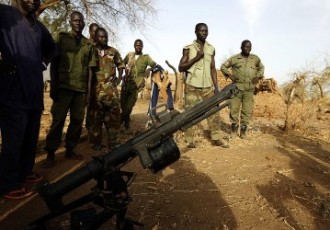Sudan’s SPLM-N vows to buck Blue Nile’s ‘coup’
September 3, 2011 (KHARTOUM) – The Sudan People’s Liberation Movement North (SPLM-N) on Saturday declared resistance to what it described as a coup against the elected governor of the Blue Nile State, Malik Aggar, announcing intensification of its efforts to forge a nationwide alliance to execute regime-change agendas.

A similar scenario has been taking place in South Kordofan, an oil-rich state which also borders South Sudan, where fighting between Sudan’s army and SPLM-N forces erupted in early June and led to the displacements of thousands of people and many deaths.
It is not yet clear who instigated the clashes but both sides accused each other of doing so. The SPLM-N claimed that Sudan’s army started the attacks and targeted the house of Aggar, Sudan on the other hand claimed it was the SPLM-N which launched the attacks.
Sudan’s President on Friday declared a state of emergency in the state and later sacked Agar from the position to which he was elected in April 2010, appointing in his place the commander-in-chief of the SAF base in the state capital Al-Damazin as a military ruler.
Meanwhile, fighting has continued amid concerns of a potential humanitarian crisis. The UN refugee spokeswoman, Fatoumata Lejeune-Kaba, said that the UNHCR had received reports of some 16,000 people fleeing across the border into Ethiopia.
In a statement, the SPLM-N’s secretary-general Yasir Arman said that the unfolding events in the Blue Nile represent a continuation of the attempts by the ruling National Congress Party (NCP) in Khartoum to “uproot active and democratic” forces in the Sudanese political arena.
Arman said that the last episode in this policy appeared in the “political and military coup” against Agar and the stalled popular consultation vote in the area which was promised under the 2005 Comprehensive Peace Agreement (CPA) between Sudan and South Sudan which gained full independence as an outcome of the same deal.
The SPLM-N, which says it is now structurally separate from the ruling party in South Sudan, urged the Sudanese people to respond to this policy which will “tear apart the rest of Sudan.”
It further urged members of the international community, including the CPA’s troika consisting of the United States, Britain and Norway, as well as the United Nations Security Council (UNSC), to respond to the impact of this “blatant coup,” by preventing further displacements in Blue Nile and South Kordofan as well as prevention of “ethnic cleansing” and targeting of civilians by the “NCP’s [Sudan’s] air forces.”
“It is time for imposing a no-fly zone stretching all the way from the Blue Nile to Darfur through a resolution by the UNSC,” Arman said.
The SPLM-N reported that abuses were already being committed by Sudan’s army, citing allegations of attacks on civilians, abduction and destruction of public facilities in the state.
Arman claimed that attacks on SPLM-N’s position continued since Thursday, saying that their forces had managed to chuck Sudan’s army out of Al-Kurmuk town and few other areas.
“We vociferously declare that the only option before us is to forge a nationwide democratic front with the agendas of a radical restructuring of the power’s center in Khartoum and build a new state that recognize others and their right to be others,” Arman announced.
He further said that the SPLM-N would seek to solidify the strategic alliance it forged last month with rebel groups in the western region of Darfur. Arman revealed that a meeting took place on Friday between him and Manni Arkoi Minnawi of Darfur rebels Sudan Liberation Movement (SLM) and Mansur Abdul Gadir of the Justice and Equality Movement (JEM), another Darfur rebel group.
According to Arman, the meeting resolved to finalise the alliance’s political program and arrange for a conference to create a strong political and military body to lead the opposition.
“We also declare that Aggar will remain the elected governor of the Blue Nile,” Arman said, saying that NCP leaders must face justice for their crimes.
The events in Blue Nile drew condemnation from Sudanese rebel forces and political parties.
Darfur’s SLM rebels denounced the events in Blue Nile as a continuation of the “never-ending crimes of genocide and crimes against humanity” by the NCP government.
It echoed calls for a wide-ranging coalition to topple the government in Khartoum and called on Agar to join the struggle to achieve that goal.
The rebel group also urged the international community to support and respect the will of Sudanese masses which joined the quest for a government change.
Another Darfur rebel, JEM, condemned in the strongest terms Khartoum’s attempt to “assassinate” Malik Agar and the ongoing military assault against people of the Blue Nile. The rebel group vowed to work in tandem with the SPLM-N to defend the people in Blue Nile.
In Khartoum, the opposition National Umma Party said it condemns the outbreak of violent events in the Blue Nile and called for an immediate ceasefire to stop the bloodshed and address the humanitarian situation.
The genesis of the ongoing clashes in the Blue Nile and South Kordofan can be traced back to May’s warning by SAF to SPLM-N to either disarm their forces or deploy to what is now the new country of South Sudan.
Blue Nile and South Kordofan are part of north Sudan but their population sided largely with the South during the second Sudanese civil war 1983-2005.
Under the CPA, the two states were supposed to hold “popular consultations” to determine the level of local satisfaction with the implementation of the agreement.
But the vote stalled in both states as efforts to reach a political settlement failed to yield results.
(ST)
